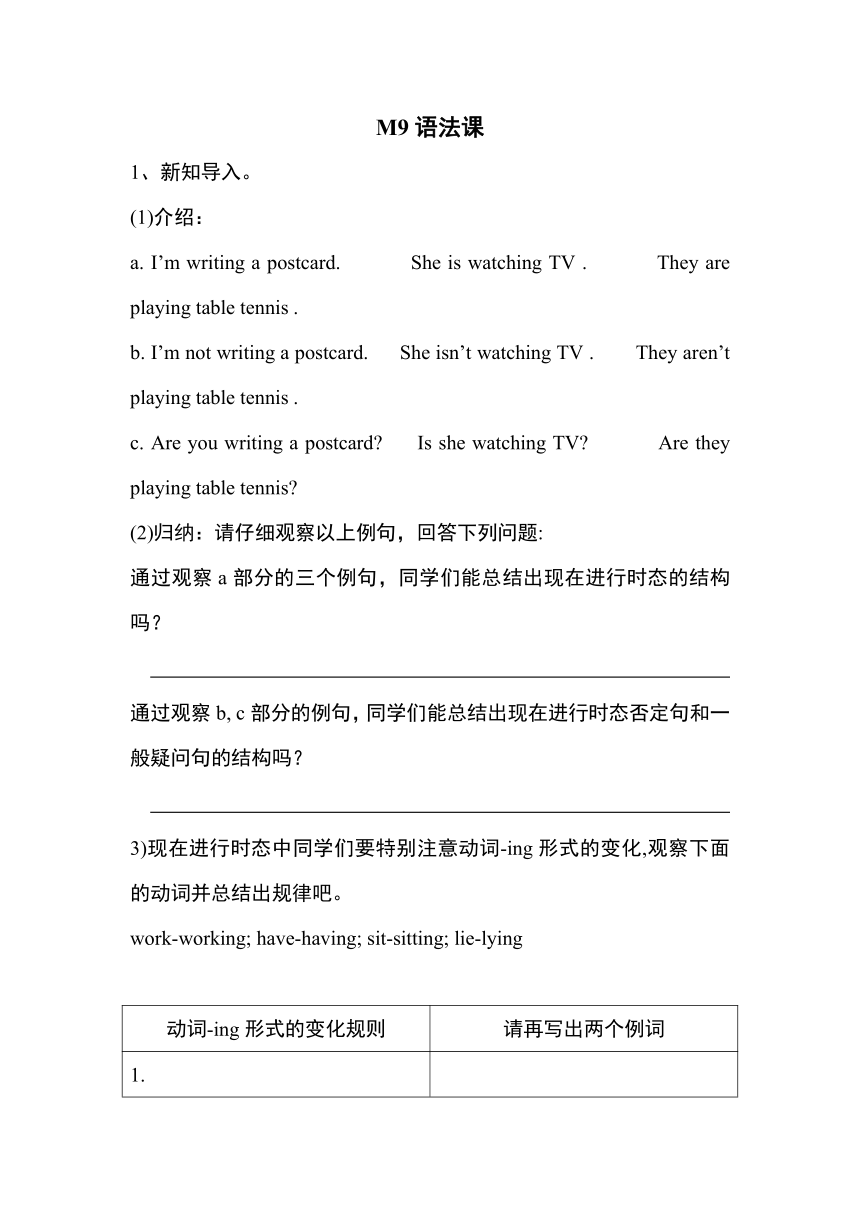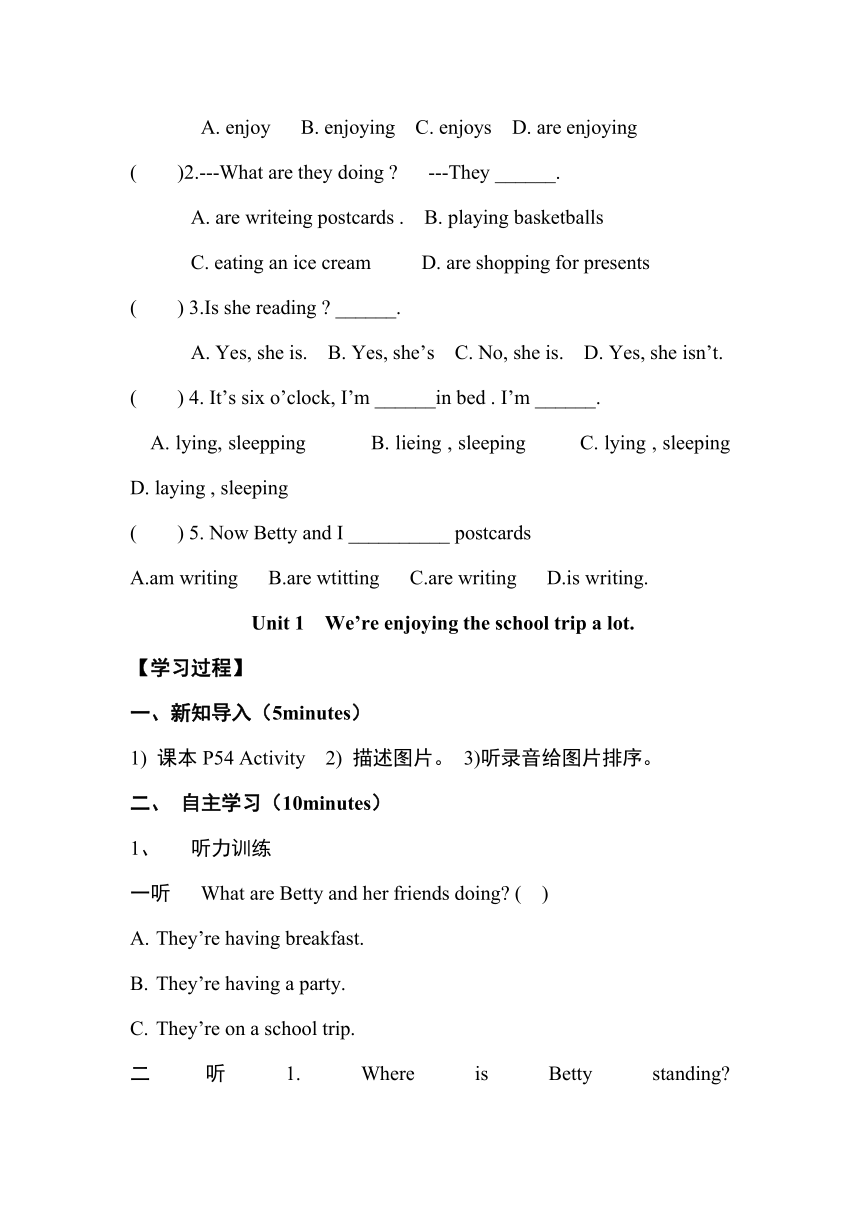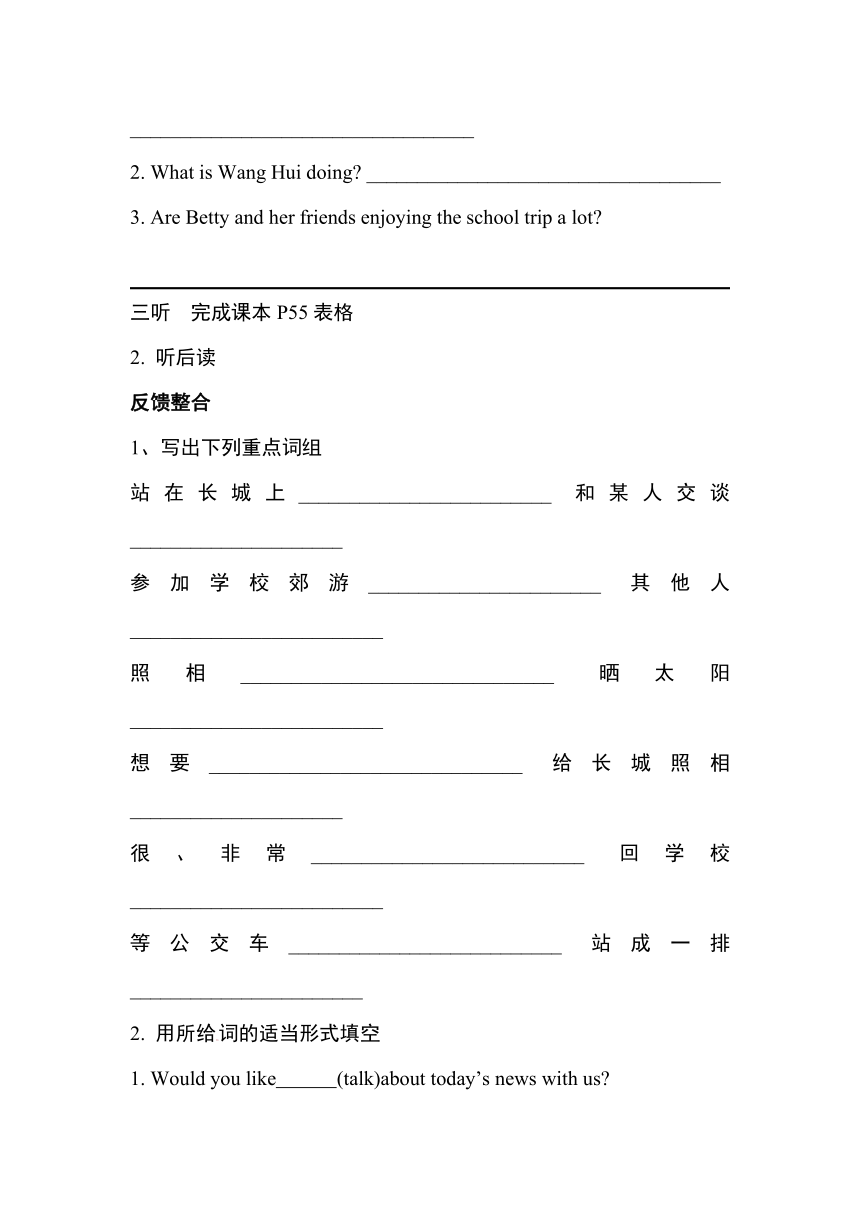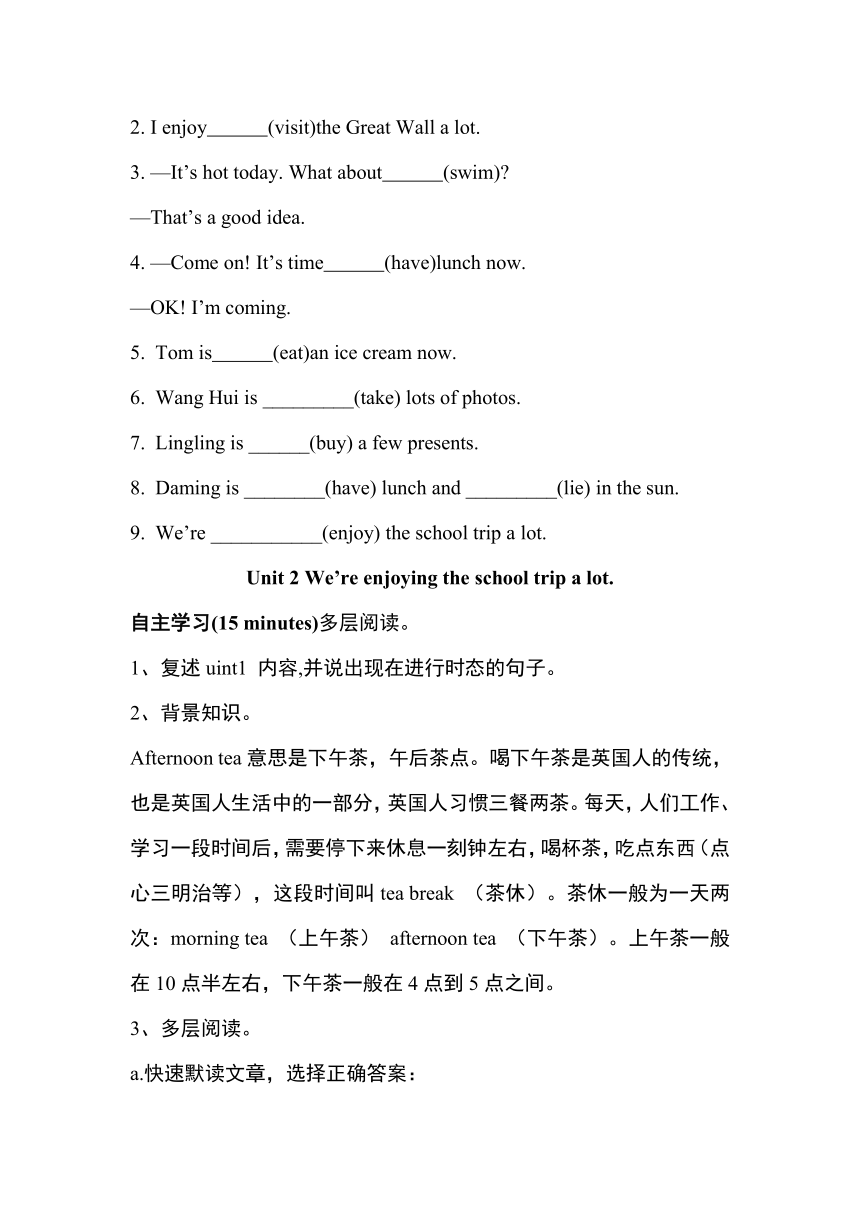外研版七年级上册英语Module 9 People and places教学设计
文档属性
| 名称 | 外研版七年级上册英语Module 9 People and places教学设计 |  | |
| 格式 | doc | ||
| 文件大小 | 67.0KB | ||
| 资源类型 | 教案 | ||
| 版本资源 | 外研版 | ||
| 科目 | 英语 | ||
| 更新时间 | 2021-07-05 20:32:40 | ||
图片预览





文档简介
M9语法课
1、新知导入。
(1)介绍:
a. I’m writing a postcard. She is watching TV . They are playing table tennis .
b. I’m not writing a postcard. She isn’t watching TV . They aren’t playing table tennis .
c. Are you writing a postcard? Is she watching TV? Are they playing table tennis?
(2)归纳:请仔细观察以上例句,回答下列问题:
通过观察a部分的三个例句,同学们能总结出现在进行时态的结构吗?
通过观察b, c部分的例句,同学们能总结出现在进行时态否定句和一般疑问句的结构吗?
3)现在进行时态中同学们要特别注意动词-ing形式的变化,观察下面的动词并总结出规律吧。
work-working; have-having; sit-sitting; lie-lying
动词-ing形式的变化规则 请再写出两个例词
1.
2.
3.
4.
写出下列动词的第三人称单数和现在分词。
buy_______ ___________ enjoy __________ ___________lie_________ ___________ take__________ ___________ leave________ __________ see ____________ ___________
drive _________ _________ shop ___________ ___________
put __________ __________ wash___________ ____________
?b. 用动词的适当形式填空。
1.??---What are you ________ (do) now? --- I _______ (eat) bread.
2.??It’s nine o’clock. My father________ (work) in the office.
3.??Look, the boys________ (put) the rubbish (垃圾) into the bin.
4.?---________ he ________ (clean) the room now?
--- No, he isn’t. He ________ (play) the piano.
??---Where is Mark? ---He________ (run) on the grass.
He is __________(have) dinner with his family now.
She is __________(do) her homework.
8. They are _________(wait) for the bus.
c. Choose the right answers.
( )1.They’re ______the school trip very much .
A. enjoy B. enjoying C. enjoys D. are enjoying
( )2.---What are they doing ? ---They ______.
A. are writeing postcards . B. playing basketballs
C. eating an ice cream D. are shopping for presents
( ) 3.Is she reading ? ______.
A. Yes, she is. B. Yes, she’s C. No, she is. D. Yes, she isn’t.
( ) 4. It’s six o’clock, I’m ______in bed . I’m ______.
A. lying, sleepping B. lieing , sleeping C. lying , sleeping D. laying , sleeping
( ) 5. Now Betty and I __________ postcards
A.am writing B.are wtitting C.are writing D.is writing.
Unit 1 We’re enjoying the school trip a lot.
【学习过程】
新知导入(5minutes)
1) 课本P54 Activity 2) 描述图片。 3)听录音给图片排序。
二、 自主学习(10minutes)
听力训练
一听 What are Betty and her friends doing? ( )
They’re having breakfast.
They’re having a party.
They’re on a school trip.
二听1. Where is Betty standing? __________________________________
2. What is Wang Hui doing? ___________________________________
3. Are Betty and her friends enjoying the school trip a lot?
三听 完成课本P55表格
2. 听后读
反馈整合
1、写出下列重点词组
站在长城上_________________________ 和某人交谈_____________________
参加学校郊游_______________________ 其他人_________________________
照相_______________________________ 晒太阳_________________________
想要_______________________________ 给长城照相_____________________
很、非常___________________________ 回学校_________________________
等公交车___________________________ 站成一排_______________________
2. 用所给词的适当形式填空
1. Would you like (talk)about today’s news with us?
2. I enjoy (visit)the Great Wall a lot.
3. —It’s hot today. What about (swim)?
—That’s a good idea.
4. —Come on! It’s time (have)lunch now.
—OK! I’m coming.
Tom is (eat)an ice cream now.
Wang Hui is _________(take) lots of photos.
Lingling is ______(buy) a few presents.
Daming is ________(have) lunch and _________(lie) in the sun.
We’re ___________(enjoy) the school trip a lot.
Unit 2 We’re enjoying the school trip a lot.
自主学习(15 minutes)多层阅读。
1、复述uint1 内容,并说出现在进行时态的句子。
2、背景知识。
Afternoon tea意思是下午茶,午后茶点。喝下午茶是英国人的传统,也是英国人生活中的一部分,英国人习惯三餐两茶。每天,人们工作、学习一段时间后,需要停下来休息一刻钟左右,喝杯茶,吃点东西(点心三明治等),这段时间叫tea break (茶休)。茶休一般为一天两次:morning tea (上午茶) afternoon tea (下午茶)。上午茶一般在10点半左右,下午茶一般在4点到5点之间。
3、多层阅读。
a.快速默读文章,选择正确答案:
(1)In London a) people aren’t leaving work. b) people are going home.
(2)In Moscow a) people aren’t going to the opera. b) people are having dinner.
(3)In Beijing a) people are getting dressed. b) people are sleeping.
(4)In Los Angeles a) people are working. b) people are getting up.
(5)In New York a) people are getting up. b) people are having lunch.
b.再次默读课文完成表格。
Place Time Activities
London
5pm
Moscow
Beijing
1am
Los Angeles
New York
(4)动手发现问题:
1) 此时此刻 ,世界不同地方的人们正在做着 不同的事情。
______________________________________________
2)他们正下班回家,他们有的在等公共汽车,有的正跑去乘火车。
______________________________________________
3)在莫斯科,时间是八点钟。人们没在喝下午茶。
______________________________________________
4)在北京,人们不在吃晚饭,他们在睡觉。
______________________________________________
5)人们不是在起床、洗漱或穿衣服。他们在工作,孩子们正开始上课。
______________________________________________
6) 他们在看望朋友、给家里打电话或买东西。
______________________________________________
独立完成上面的句子,与课本原句对照,你发现了那些没有预料到的细节错误?
朗读课文, 写出下列重点词组。
1)此时此刻 ________________2)不同的地方 ________________
3)不同的事情 ________________ 4)下班 ________________
5)等车 ________________ 6)喝下午茶 ______________
7)在餐馆吃晚饭 ________________ 8)去听歌剧 ________________
9)看芭蕾舞 ________________ 10)穿衣服 ________________
11)吃汉堡 ________________ 12)喝咖啡 ________________
( ) 1. The girl is ______ in bed and reading a story book.
A. leaving B. waiting C. shopping D. lying
( ) 2. --- Where’s your dad, Tony?
--- He’s watching TV in the living room ______.
A. at the moment B. for the moment C. for a moment D. in a moment
( ) 3. We ______ our lessons at 8 a.m. from Monday and Friday.
A. finish B. start C. drink D. write
( ) 4. Daming is ___ for his friend, Wang Hui. They want to go to the cinema.
A. talking B. enjoying C. calling D. waiting
( ) 5. The workers are ______ work and going home.
A. standing B. having C. leaving D. going
( ) 6. My computer can work again. Thanks ______, Mr. Wang.
A. a lot B. a lot of C. lots of D. a little
( ) 7. The children are ______ in the park. They look so happy.
A. doing homework B. shopping C. getting up D. having a good time
( ) 8. Tony is ______ his visit. He isn’t at home.
A. sleeping B. running C. enjoying D. Playing
( )9. Li Tong is a postcard her friend.
A. taking; for B. buying; to C. sending; to D. sending; from
( ) 10. I the blackboard carefully, but nothing.
A. look; look at B. look at; see C. see; see D. see; look at
( ) 11. —I’ll go to America for a trip next week.
—Great! ?
A. Good luck! B. Glad to see you again! C. Best wishes! D. Have a good time!
( ) 12. —Are they doing their homework now?
— .
A. Yes, they are B. Yes, they do C. No, they don’t D. No, they are
( ) 13. Look, some people photos on the beach.
A. took B. takes C. are taking D. is taking
用所给词的适当形式填空
1. — John (enjoy)his trip now?
—Yes, he is.
2. Thank you for (come)to my party.
3. They (not have)breakfast at the moment.
4. —What is Tony doing?
—He (eat)some fruit.
5. It’s half past five in the afternoon, and people (leave)work.
1、新知导入。
(1)介绍:
a. I’m writing a postcard. She is watching TV . They are playing table tennis .
b. I’m not writing a postcard. She isn’t watching TV . They aren’t playing table tennis .
c. Are you writing a postcard? Is she watching TV? Are they playing table tennis?
(2)归纳:请仔细观察以上例句,回答下列问题:
通过观察a部分的三个例句,同学们能总结出现在进行时态的结构吗?
通过观察b, c部分的例句,同学们能总结出现在进行时态否定句和一般疑问句的结构吗?
3)现在进行时态中同学们要特别注意动词-ing形式的变化,观察下面的动词并总结出规律吧。
work-working; have-having; sit-sitting; lie-lying
动词-ing形式的变化规则 请再写出两个例词
1.
2.
3.
4.
写出下列动词的第三人称单数和现在分词。
buy_______ ___________ enjoy __________ ___________lie_________ ___________ take__________ ___________ leave________ __________ see ____________ ___________
drive _________ _________ shop ___________ ___________
put __________ __________ wash___________ ____________
?b. 用动词的适当形式填空。
1.??---What are you ________ (do) now? --- I _______ (eat) bread.
2.??It’s nine o’clock. My father________ (work) in the office.
3.??Look, the boys________ (put) the rubbish (垃圾) into the bin.
4.?---________ he ________ (clean) the room now?
--- No, he isn’t. He ________ (play) the piano.
??---Where is Mark? ---He________ (run) on the grass.
He is __________(have) dinner with his family now.
She is __________(do) her homework.
8. They are _________(wait) for the bus.
c. Choose the right answers.
( )1.They’re ______the school trip very much .
A. enjoy B. enjoying C. enjoys D. are enjoying
( )2.---What are they doing ? ---They ______.
A. are writeing postcards . B. playing basketballs
C. eating an ice cream D. are shopping for presents
( ) 3.Is she reading ? ______.
A. Yes, she is. B. Yes, she’s C. No, she is. D. Yes, she isn’t.
( ) 4. It’s six o’clock, I’m ______in bed . I’m ______.
A. lying, sleepping B. lieing , sleeping C. lying , sleeping D. laying , sleeping
( ) 5. Now Betty and I __________ postcards
A.am writing B.are wtitting C.are writing D.is writing.
Unit 1 We’re enjoying the school trip a lot.
【学习过程】
新知导入(5minutes)
1) 课本P54 Activity 2) 描述图片。 3)听录音给图片排序。
二、 自主学习(10minutes)
听力训练
一听 What are Betty and her friends doing? ( )
They’re having breakfast.
They’re having a party.
They’re on a school trip.
二听1. Where is Betty standing? __________________________________
2. What is Wang Hui doing? ___________________________________
3. Are Betty and her friends enjoying the school trip a lot?
三听 完成课本P55表格
2. 听后读
反馈整合
1、写出下列重点词组
站在长城上_________________________ 和某人交谈_____________________
参加学校郊游_______________________ 其他人_________________________
照相_______________________________ 晒太阳_________________________
想要_______________________________ 给长城照相_____________________
很、非常___________________________ 回学校_________________________
等公交车___________________________ 站成一排_______________________
2. 用所给词的适当形式填空
1. Would you like (talk)about today’s news with us?
2. I enjoy (visit)the Great Wall a lot.
3. —It’s hot today. What about (swim)?
—That’s a good idea.
4. —Come on! It’s time (have)lunch now.
—OK! I’m coming.
Tom is (eat)an ice cream now.
Wang Hui is _________(take) lots of photos.
Lingling is ______(buy) a few presents.
Daming is ________(have) lunch and _________(lie) in the sun.
We’re ___________(enjoy) the school trip a lot.
Unit 2 We’re enjoying the school trip a lot.
自主学习(15 minutes)多层阅读。
1、复述uint1 内容,并说出现在进行时态的句子。
2、背景知识。
Afternoon tea意思是下午茶,午后茶点。喝下午茶是英国人的传统,也是英国人生活中的一部分,英国人习惯三餐两茶。每天,人们工作、学习一段时间后,需要停下来休息一刻钟左右,喝杯茶,吃点东西(点心三明治等),这段时间叫tea break (茶休)。茶休一般为一天两次:morning tea (上午茶) afternoon tea (下午茶)。上午茶一般在10点半左右,下午茶一般在4点到5点之间。
3、多层阅读。
a.快速默读文章,选择正确答案:
(1)In London a) people aren’t leaving work. b) people are going home.
(2)In Moscow a) people aren’t going to the opera. b) people are having dinner.
(3)In Beijing a) people are getting dressed. b) people are sleeping.
(4)In Los Angeles a) people are working. b) people are getting up.
(5)In New York a) people are getting up. b) people are having lunch.
b.再次默读课文完成表格。
Place Time Activities
London
5pm
Moscow
Beijing
1am
Los Angeles
New York
(4)动手发现问题:
1) 此时此刻 ,世界不同地方的人们正在做着 不同的事情。
______________________________________________
2)他们正下班回家,他们有的在等公共汽车,有的正跑去乘火车。
______________________________________________
3)在莫斯科,时间是八点钟。人们没在喝下午茶。
______________________________________________
4)在北京,人们不在吃晚饭,他们在睡觉。
______________________________________________
5)人们不是在起床、洗漱或穿衣服。他们在工作,孩子们正开始上课。
______________________________________________
6) 他们在看望朋友、给家里打电话或买东西。
______________________________________________
独立完成上面的句子,与课本原句对照,你发现了那些没有预料到的细节错误?
朗读课文, 写出下列重点词组。
1)此时此刻 ________________2)不同的地方 ________________
3)不同的事情 ________________ 4)下班 ________________
5)等车 ________________ 6)喝下午茶 ______________
7)在餐馆吃晚饭 ________________ 8)去听歌剧 ________________
9)看芭蕾舞 ________________ 10)穿衣服 ________________
11)吃汉堡 ________________ 12)喝咖啡 ________________
( ) 1. The girl is ______ in bed and reading a story book.
A. leaving B. waiting C. shopping D. lying
( ) 2. --- Where’s your dad, Tony?
--- He’s watching TV in the living room ______.
A. at the moment B. for the moment C. for a moment D. in a moment
( ) 3. We ______ our lessons at 8 a.m. from Monday and Friday.
A. finish B. start C. drink D. write
( ) 4. Daming is ___ for his friend, Wang Hui. They want to go to the cinema.
A. talking B. enjoying C. calling D. waiting
( ) 5. The workers are ______ work and going home.
A. standing B. having C. leaving D. going
( ) 6. My computer can work again. Thanks ______, Mr. Wang.
A. a lot B. a lot of C. lots of D. a little
( ) 7. The children are ______ in the park. They look so happy.
A. doing homework B. shopping C. getting up D. having a good time
( ) 8. Tony is ______ his visit. He isn’t at home.
A. sleeping B. running C. enjoying D. Playing
( )9. Li Tong is a postcard her friend.
A. taking; for B. buying; to C. sending; to D. sending; from
( ) 10. I the blackboard carefully, but nothing.
A. look; look at B. look at; see C. see; see D. see; look at
( ) 11. —I’ll go to America for a trip next week.
—Great! ?
A. Good luck! B. Glad to see you again! C. Best wishes! D. Have a good time!
( ) 12. —Are they doing their homework now?
— .
A. Yes, they are B. Yes, they do C. No, they don’t D. No, they are
( ) 13. Look, some people photos on the beach.
A. took B. takes C. are taking D. is taking
用所给词的适当形式填空
1. — John (enjoy)his trip now?
—Yes, he is.
2. Thank you for (come)to my party.
3. They (not have)breakfast at the moment.
4. —What is Tony doing?
—He (eat)some fruit.
5. It’s half past five in the afternoon, and people (leave)work.
同课章节目录
- Starte
- Module 1 My teacher and my friends
- Module 2 My English lesson
- Module 3 My English book
- Module 4 My everyday life
- Module 1 My classmates
- Unit 1 Nice to meet you.
- Unit 2 I'm Wang Lingling and I'm thirteen years ol
- Unit 3 Language in use.
- Module 2 My family
- Unit 1 Is this your mum?
- Unit 2 These are my parents.
- Unit 3 Language in use.
- Module 3 My school
- Unit 1 There are thirty students in my class.
- Unit 2 The library is on the left of the playgroun
- Unit 3 Language in use.
- Module 4 Healthy food
- Unit 1 We've got lots of apples.
- Unit 2 Is your food and drink healthy?
- Unit 3 Language in use.
- Module 5 My school day
- Unit 1 I love history.
- Unit 2 We start work at nine o'clock.
- Unit 3 Language in use.
- Revision module A
- Module 6 A trip to the zoo
- Unit 1 Does it eat meat?
- Unit 2 The tiger lives in Asia.
- Unit 3 Language in use.
- Module 7 Computers
- Unit 1 How do I write my homework on the computer?
- Unit 2 When do you use a computer?
- Unit 3 Language in use.
- Module 8 Choosing presents
- Unit 1 I always like birthday parties.
- Unit 2 She often goes to concerts.
- Unit 3 Language in use.
- Module 9 People and places
- Unit 1 We're enjoying the school trip a lot.
- Unit 2 They're waiting for buses or trains.
- Unit 3 Language in use.
- Module 10 Spring Festival
- Unit 1 Are you getting ready for Spring Festival?
- Unit 2 My mother's cleaning our houses and sweepin
- Unit 3 Language in use.
- Revision module B
